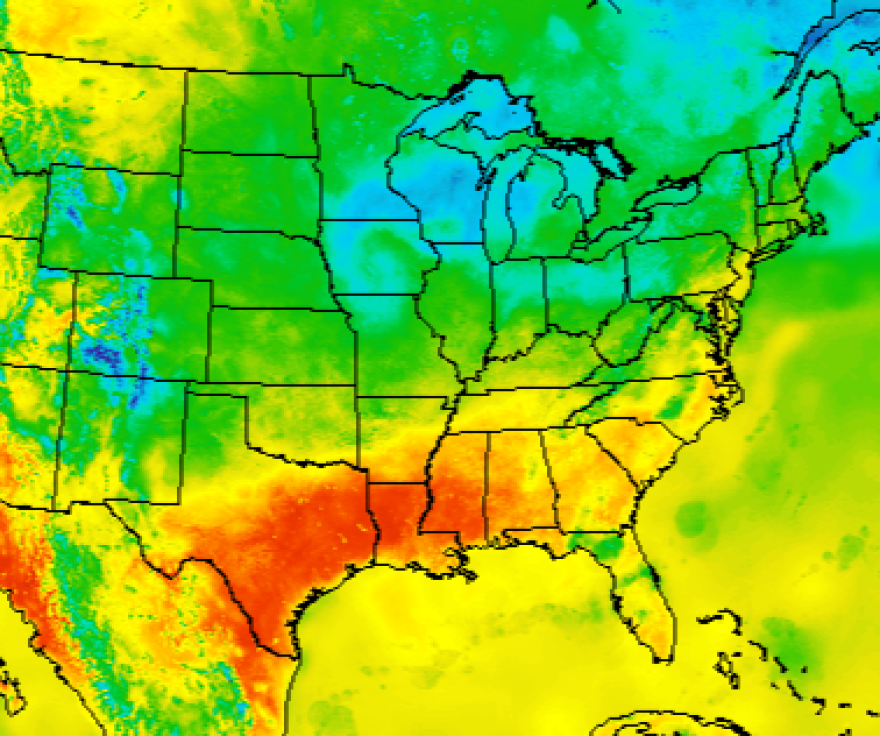Gov. John Bel Edwards issued a state of emergency in Louisiana on Friday as record-breaking heat continues to create dangerous conditions across much of the South.
The declaration comes after weeks of temperatures topping out in the mid-90s to low-100s across the state. Heat indices, or “feels like” temperatures, have peaked around 120 degrees at times.
On top of the extreme heat, Louisiana is also experiencing a lengthy drought that triggered statewide burn bans this month and led to a state of emergency in Plaquemines Parish, where low flows in the Mississippi River have allowed saltwater from the Gulf of Mexico to creep inland and threaten water supplies. At least one other parish has also seen its drinking water supply diminished by low river levels.
“This summer, the National Weather Service has issued a record number of excessive heat warnings for Louisiana,” said Edwards. “This declaration will allow the state to mobilize resources and aid those most affected. Please continue to take precautions when you are outside and check on neighbors who might need assistance.”
According to the emergency declaration, several local water systems across Louisiana have experienced outages and boil-water advisories due to the drought and increased water demand.
The emergency declaration will allow the state to make more resources available to parishes and freeze prices on common items like water bottles to prevent price gouging.
As the heat persists, Louisianans unable to escape it face serious health risks. The state has already surpassed its average numbers of annual heat-related deaths and emergency room visits, according to data from the Louisiana Department of Health.
In the four months from April to August, state health agency data shows that nearly 4,000 people went to the hospital for heat-related illnesses, with more than a quarter of those visits occurring in southeast Louisiana. In New Orleans, heat-related calls for service quadrupled from 25 per month to 100.
The statewide declaration came three days after the City of New Orleans issued its own state of emergency, citing concern over the compounding danger of extreme heat and hurricanes as the Atlantic enters peak storm season.
“Thinking about the unprecedented times and challenges we are living in and having to work through, the City recognizes the need to be proactive to the excessive heat that we know is not going to slow down,” said New Orleans Mayor LaToya Cantrell.
As a result of its own declaration, the city took several measures:
- Expanded hours for nine of 15 air-conditioned recreation centers in the city, which will be available seven days a week until Oct. 1.
- Increased outreach and heat-relief resources for unhoused people.
- Dispatched an overnight cooling center equipped with an emergency generator for unhoused residents through Oct. 1.
- Made plans to stage New Orleans Recreation Development Commission sites with generators in case of tropical weather.
- Established new daily reporting requirements for senior living facilities and nursing homes.
- Expedited emergency repairs to protect city employees, outdoor workers and first responders from the heat.
Heat in New Orleans and Baton Rouge has broken several daily records since June. In that time, the National Weather Service has issued 18 excessive heat warnings for New Orleans, far exceeding the record of 5 in 2020.
Globally, July marked the hottest month ever recorded on Earth, according to the National Oceanic and Atmospheric Administration. The intense heat felt across the planet is part of a long pattern of warming resulting from human-caused climate change, which is attributed in large part to the burning of fossil fuels.
The governor’s emergency declaration will continue through Sept. 9 unless terminated sooner. New Orleans’ emergency declaration didn’t include an end date.







